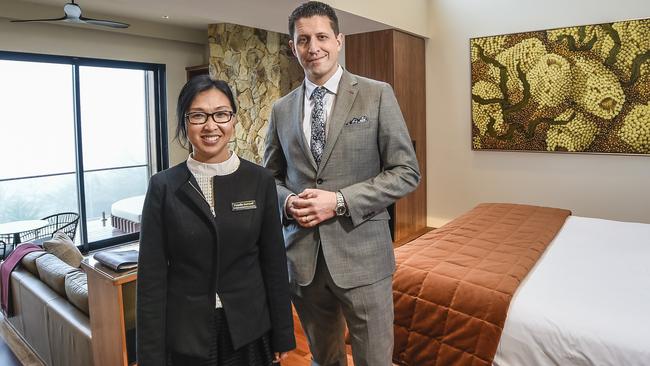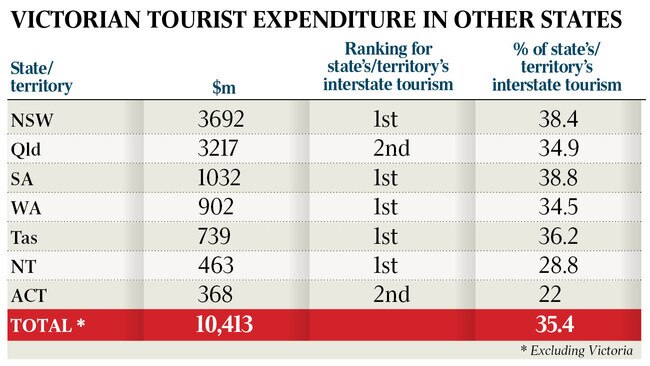Coronavirus: Victorians key to tourism revival
Victorians are the biggest spending domestic tourists in five states and territories, making them crucial to an economic recovery.

Victorians are the biggest spending domestic tourists in five of Australia’s states and territories, making its residents crucial to the country’s economic recovery as increased community transmission in Melbourne spooks premiers and triggers consideration of further lockdowns.
As NSW Premier Gladys Berejiklian urges businesses in her state “not to welcome anybody” from Melbourne hot spots, The Australian can reveal Victorians last year spent the most on interstate tourism in NSW ($3.7bn), South Australia ($1bn), Western Australia ($902m), Tasmania ($739m) and the Northern Territory ($463m).
Data from Tourism Research Australia, part of Austrade, shows Victorian travellers were the second-biggest tourism spenders in Queensland ($3.2bn) and the ACT ($368m), trailing only the most populous state of NSW.
While Scott Morrison as well as business and tourism groups have warned states not to slow their reopening because of outbreaks, South Australian Premier Steven Marshall said he was looking at what was happening in Victoria “extraordinarily carefully”.
“We will be opening our borders on July 20. Having said that, I do emphasise we’re not going to lift the borders if we’re going to go backwards as a state,” he said. “We’ve got nearly four weeks until that date … but we as a nation have got on top of outbreaks and clusters before and I’m sure that’s exactly what will happen in Victoria.”

Ms Berejiklian encouraged NSW businesses to consider who they were allowing on to their premises and said residents of her state should not be travelling to the Victorian capital.
“I would encourage businesses not to welcome anybody from those (Melbourne) hot spots. Because the advice from the Victorian Premier is ‘do not travel interstate if you’re from one of those hot spots’,” Ms Berejiklian said. “My advice is even stronger, it’s ‘do not go down there’. And certainly I think it’s the prerogative of every business, every organisation not to accept anybody from those hot spots at this time.”
Jesse Kornoff, general manager of boutique hotel Mount Lofty House in the Adelaide Hills, said revenue had halved in June compared to the same time last year and was only at 2 per cent in April when the coronavirus pandemic was at its peak.
The luxury accommodation and three-hat dining restaurant normally have 68 per cent of guests from interstate, with the most from Victoria, compared to 3 per cent of international travellers and the rest from South Australia (about 29 per cent).
“We’re seeing South Australian travellers only at this point,” Mr Kornoff said. “We’re seeing a lot of them. Their support has been absolutely magnificent but we’re expecting interstate travel — and particularly now people aren’t able to travel overseas — we’re expecting people to book a lot longer trips here … replacing their holiday to Asia, Europe or elsewhere. That business will be critical, it won’t just be across weekend dates.”
Australian Chamber of Commerce and Industry chief James Pearson said localised COVID-19 outbreaks should not lead to states and territories halting the gradual restart of their economies.
“Australia’s goal has been to flatten the curve by suppressing the virus, not eliminating it,” Mr Pearson said.
“It is important that we reopen the economy as much as possible or this recession will become deeper with a longer recovery time. Australia is now in a very good position when it comes to easing restrictions and getting people back to work.”
Amanda Rohan, Chamber of Commerce and Industry Queensland’s general manager of advocacy and policy, said the lack of certainty over the state’s border reopening on July 10 was having a significant impact on the wellbeing of small and medium-sized businesses and the 1.8 million jobs they had supported.
“We understand that the current influx of COVID-19 cases in Victoria is concerning and we are deeply concerned this will add further uncertainty to businesses and sectors relying on the border reopening,” Ms Rohan said.
“We have said before that Premier (Annastacia) Palaszczuk seems to be waiting for conditions to be perfect before allowing the economic revival to commence. Still, the reality is, that conditions might never be perfect. However, businesses have COVID-safe action plans in place.”




To join the conversation, please log in. Don't have an account? Register
Join the conversation, you are commenting as Logout